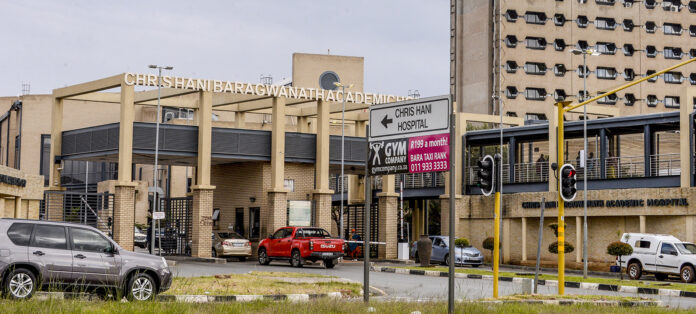A high court judge has condemned the unlawful use of SAPS flying squad members together with high-speed patrol officers to forcefully remove a building contractor from a multi-million rand oncology centre construction site at the Chris Hani Baragwanath Hospital last month.
The fallout between Unicore Holdings – a pharmaceutical company – and AIS Construction Engineers played itself out in the Pretoria High Court, where it emerged that the construction of oncology centres at Chris Hani Baragwanath and Dr George Mukhari hospitals is in jeopardy.
Unicore, which has been contracted to build the centres at a cost of R300-million by the Gauteng Department of Health, wholly subcontracted the work to AIS, which commenced construction last year.
Unicore terminated its contract with AIS on July 10, and in a dramatic show of force, flying squad members and highway patrol police stormed the construction site and forcibly removed the construction engineering company’s employees.
Judge Dirk van Zyl described the move as deplorable, given that they were caught on camera and that this footage had been viewed by the court.
“Instead, on the afternoon of July 12 2025, AIS was forcefully removed from the Chris Hani Baragwanath Hospital site by members of the South African Police Service and the Gauteng Highway Patrol. Videos of the forceful removal were provided and settle any factual dispute that appears from the papers – the videos speak for themselves: AIS was in peaceful and undisturbed possession and control of a fenced-off construction site and was forcefully removed,” the judge noted in his ruling.
When handing down his cost order in favour of AIS, Judge van Zyl said: “The aforestated consideration, together with Unicore’s deplorable conduct in respect of AIS’ eviction from the … [Chris Hani Baragwanath Hospital construction] site on July 12 2025, fully justifies that Unicore pays the costs of both the application in convention and reconvention.”
The dispute centres on two critical oncology facilities desperately needed by poor South Africans who cannot access expensive private healthcare.
The Gauteng Department of Health contracted Unicore Holdings in August 2024 to build radiation oncology facilities.
These facilities represent a lifeline for cancer patients in the public healthcare system who cannot afford private treatment.
Unicore subcontracted all the work to AIS Construction Engineers, with construction beginning in September 2024.
However, relations deteriorated in January 2025 when stop-work instructions were issued, citing technical and compliance concerns.
The high court found that AIS had been unlawfully spoliated from the Chris Hani Baragwanath Hospital construction site and therefore ordered its possession be immediately restored.
The judge noted that Unicore had failed to follow proper procedures before resorting to the dramatic police action.
“What ought to have happened in the circumstances is Unicore ought to have instructed AIS to leave the site, and if AIS still refused, Unicore ought to have approached the court to obtain the necessary relief,” reads the judgment.
Crucially, the court suspended Unicore’s right to instruct AIS to leave the Chris Hani site until AIS’s possession has been fully restored, effectively preventing Unicore from circumventing the restoration order.
The ruling also clarified that while Unicore may have certain procedural rights following contract termination, these are subject to potential challenge through the contracts’ dispute resolution mechanisms, including adjudication or arbitration.
When contacted by Sunday World about the incident, police spokesperson Brigadier Brenda Muridili said: “The provincial head of rapid response services has been informed about the allegations against SAPS Flying Squad members, and he has undertaken to investigate whether or not they have acted out of their policing scope.”
Muridili also said: “District Johannesburg detectives will, further to the internal enquiry, also investigate the alleged misuse of SAPS resources and determine what disciplinary measures should be actioned.”
The case highlights the complex legal and practical challenges facing major public infrastructure projects, particularly those providing essential healthcare services to vulnerable communities.
The delay in completing these oncology facilities could have serious implications for cancer patients who depend on public healthcare services in Gauteng province.



